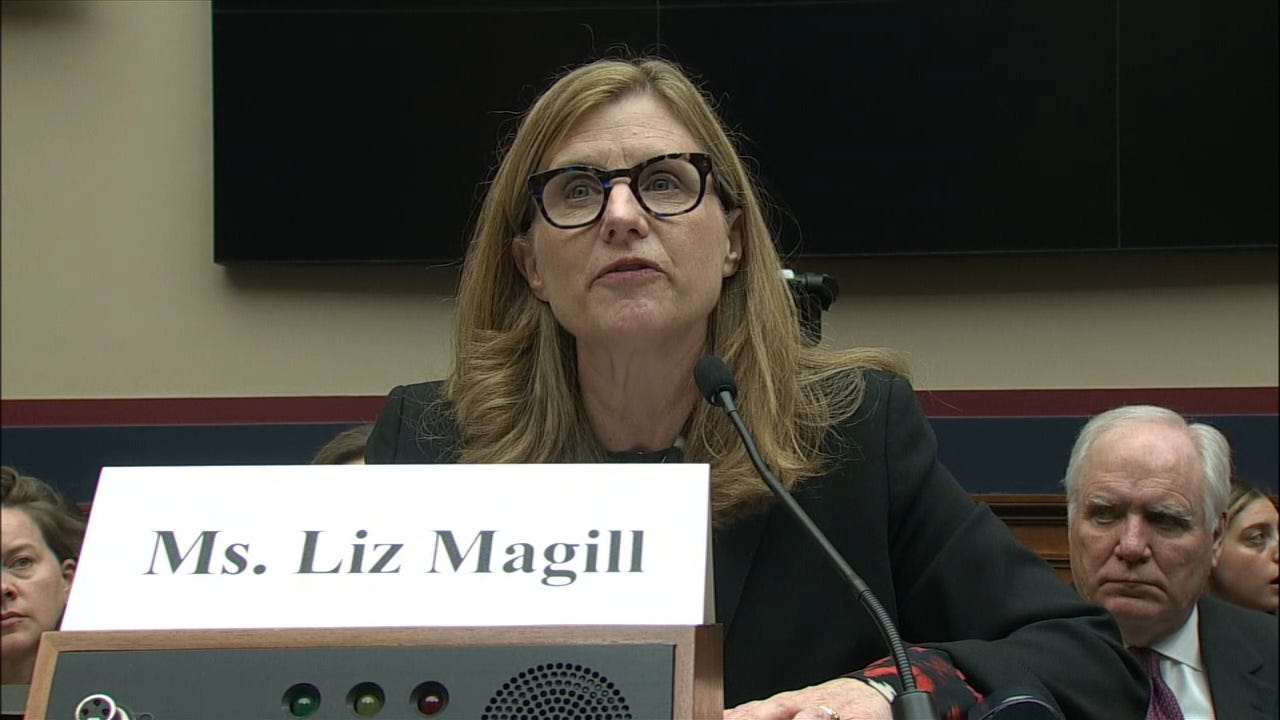Should Minouche Shafik keep her job?

Ah, leave it to the politicians to make an already troubling situation worse. House Speaker Mike Johnson and some cronies parachuted into Columbia University the other day to call for University’s President Nemat “Minouche” Shafik’s scalp “if she could not immediately bring order to this chaos.” He even suggested that the National Guard be called onto campus. Earlier, Sens. Tom Cotton and Josh Hawley had called on President Biden to order in the guard.
The pithy response from students to Johnson’s appearance on the Low Steps was blunt: “Mike, you suck,” the crowd chanted.
Of course, Republican politicians in D.C. had already stoked the fires at the school with their grilling of Shafik on April 17, followed soon after by demands that Shafik step down. In an April 22 letter, several GOP politicians led by Rep. Elise Stefanik argued that she must quit because “anarchy has engulfed the campus.”
So, are these politicians being helpful? As they poke, prod, provoke and use inflammatory rhetoric, are they clarifying the underlying ugliness of antisemitism at the university? Are they casting oil on troubled waters or, instead, throwing gasoline on a long-burning fire? And should Shafik resign?
To the first point, the political grandstanding – part of a longstanding GOP attack on higher education and particularly on elite schools – is anything but helpful. As they ensnare university leaders in rhetorical traps (see “it is a context-dependent decision”), they embarrass such officials and feed red meat to their bases. But do they really reveal the sentiments of such university leaders, who struggle to thread the needle between permitting free speech and academic freedom and tolerating unacceptable rhetoric and action?

Shortly before being forced out as president of the University of Pennsylvania, Liz Magill delivered an impassioned speech in which she said: “Our Jewish community is afraid… Our Muslim, Arab, and Palestinian communities feel unseen and unheard. I condemn the death threats and doxing that many at Penn are experiencing based only on their identity, their affiliations, or their views of the suffering in this war … This is a dark and difficult time for the world. And it is a dark and difficult time for Penn.”
Does that better reflect her sentiments than her poor performance in Congress did in December? Her inquisitors, polished in the ways of Washington, had their knives sharpened for her, of course, and they sent their blades home with a vengeance. The academics looked, well, academic in response and it served them poorly.
After she drove out Magill, Stefanik crowed: “One down, two to go.” She referred to former Harvard President Claudine Gay, who was subsequently ousted, mainly in a plagiarism scandal, and to MIT head Sally Kornbluth, who remains on the job. This was all before Shafik testified, of course.
Nominally, the right claims that the administrators must go because they are failing to protect Jewish students. But are such students really their concern? Or is it, rather, the “woke” agenda they’ve been deriding for years, particularly at elite schools? Are they, in fact, demagogues intent on riling up their often-undereducated supporters? Are they merely opportunists?

That brings us to the question of Shafik’s job performance. Should she quit? Many lawmakers, mostly on the right, think so. No doubt, they see the blood in the water and are loving it. From the rightist perspective, Shafik has been too weak and should have crushed the protests. With their calls for a military intervention, one wonders whether they would have applauded the Tiananmen Square massacre of 1989.
But Columbia’s faculty, through the school senate, has so far stopped short of demanding Shafik’s resignation. The group could censure her for bringing the NYPD on campus to arrest students, something many find to be an unacceptable intrusion on academic freedom and free speech.
Indeed, it’s for such reasons that some on the left want her out. Former Columbia Spectator executive editor Oren Root, for one, demanded that she leave in an op-ed in the school paper: “She has disgraced the good name of Columbia, caused incalculable nationwide injury to increasingly fragile academic freedoms, and wreaked unjustifiable harm on students and faculty members who are protesting the wanton killing of defenseless men, women, and children—many thousands of children—in Gaza.”
So far, the university’s trustees are siding with Shafik, a most accomplished person whom they hired just in January of 2023 and who took her post on last July 1. “During the search process for this role, President Shafik told us that she would always take a thoughtful approach to resolving conflict, balancing the disparate voices that make up a vibrant campus like Columbia’s, while taking a firm stance against hatred, harassment and discrimination,” the trustees said. “That’s exactly what she’s doing now. We are urgently working with her to help resolve the situation on campus and rebuild the bonds of our community; we encourage everyone who cares about Columbia to join us in that effort.”
For now, I much hope Shafik keeps her post, mainly because feeding the right-wing attack on higher education is far too unsavory. Politicians of whatever stripe, moreover, should not have the right to dictate who can lead a private university (or public ones, for that matter). The trustees should stick to their guns and stick it in the eye of the likes of Speaker Johnson.
But Shafik’s actions in coming days and weeks will really determine her fate. Calling in the NYPD was a mistake, in my view; letting the protest peter out in advance of graduation would have been a smarter course.
But if she can negotiate a peaceful end to the demonstration well in advance of the university’s May 15 graduation, the school will be better served. Disappointingly, the graduation – and those at other schools around the country – will almost certainly be marked by protests. And repulsive as they are, academic freedom permits them.

A troubling amount of antisemitism, no doubt, underlays much of those protests. We have seen a rise in that pathology across the country, emboldened years ago by then-President Trump’s disgraceful response to the Charlottesville Nazis. But I suspect students are driven more by revulsion at the bloodshed in Gaza. In that respect, I suggest that the universities have failed in their primary mission – to educate. They have not adequately schooled the young about the horrors of Hamas and the reasons Israel has acted so aggressively.
This academic year will soon end and, indeed, the war in Gaza will eventually end. Will our universities rise to the occasion in the fall to make sure students really understand the issues they are demonstrating about?
